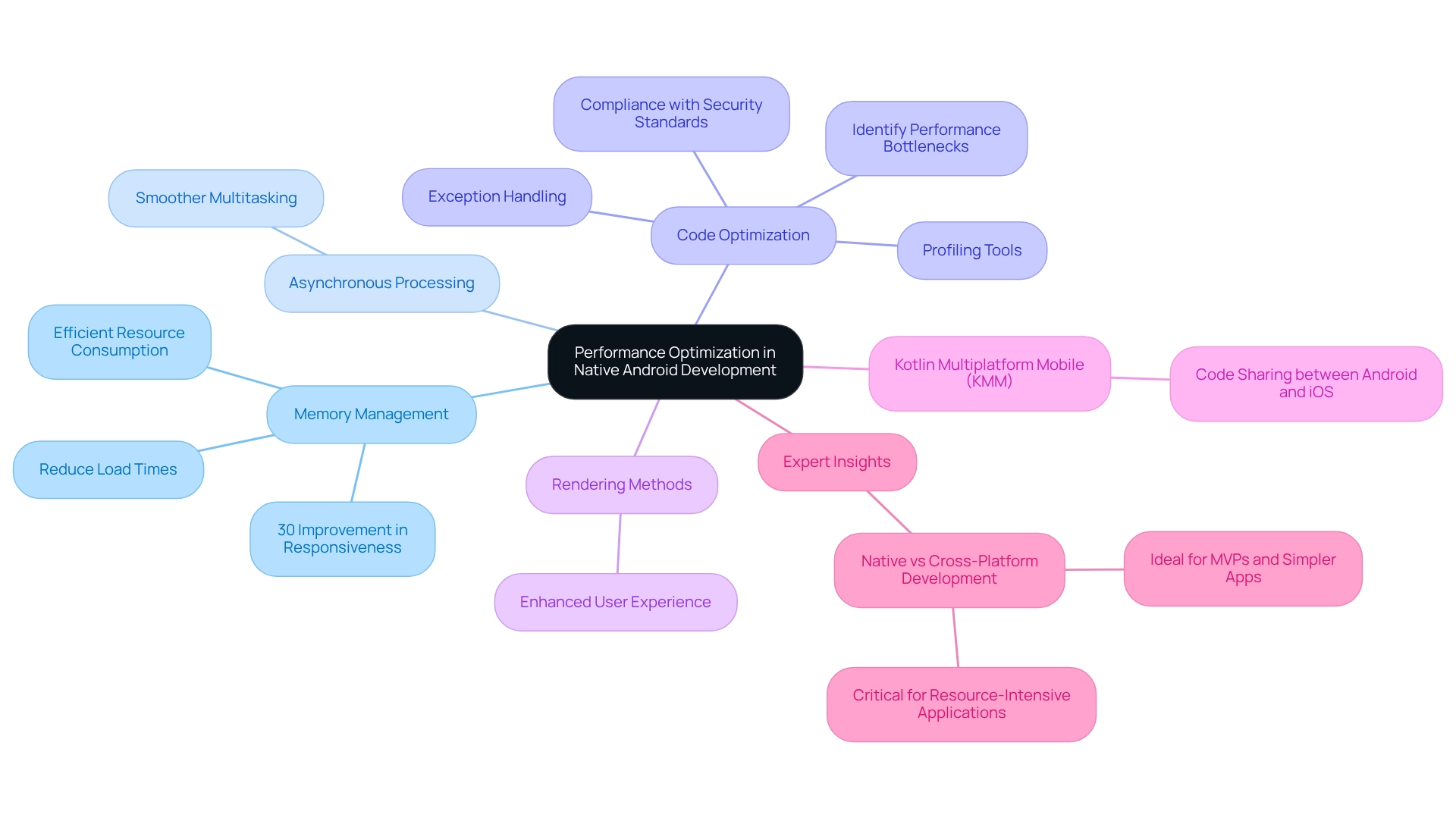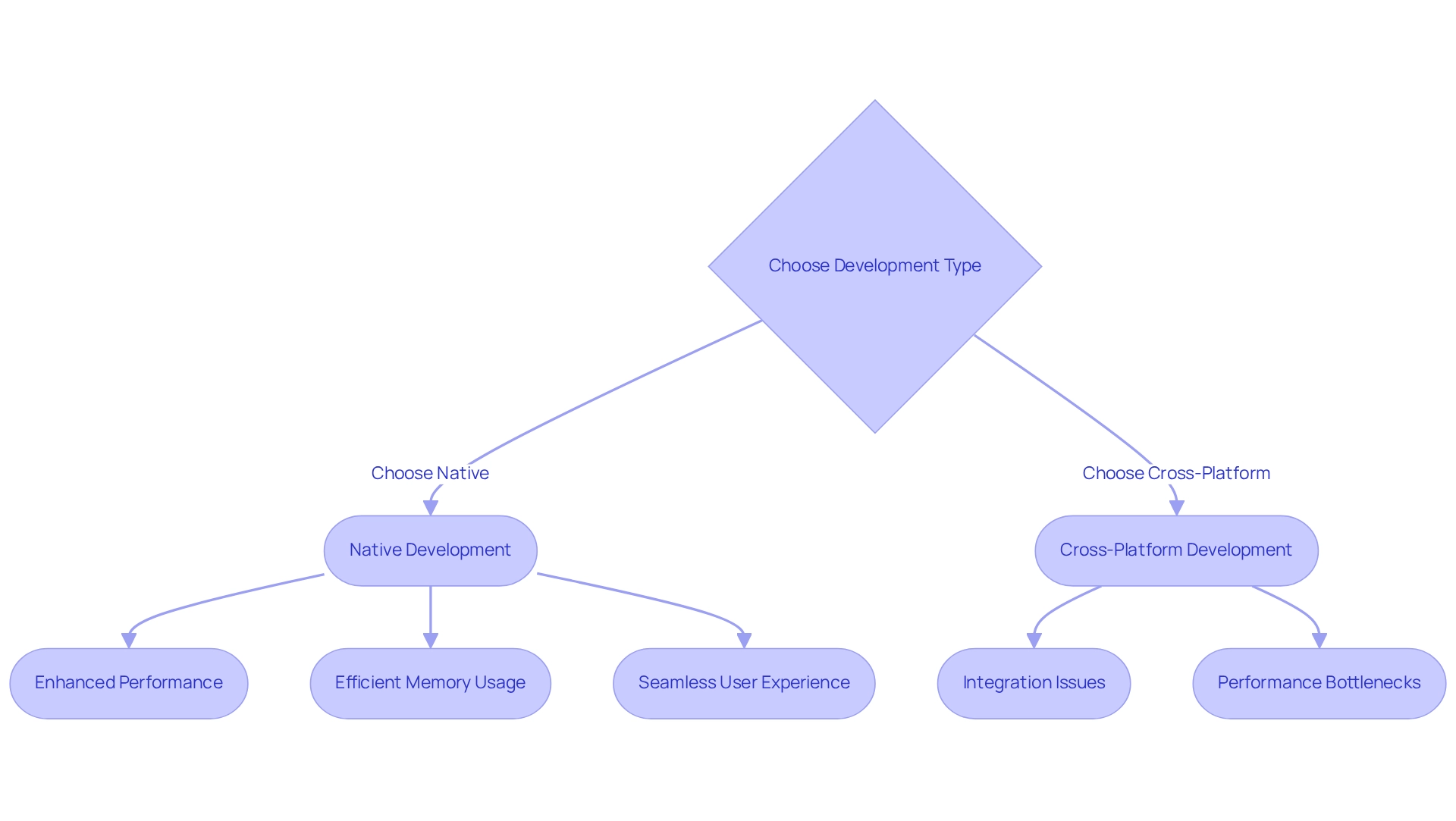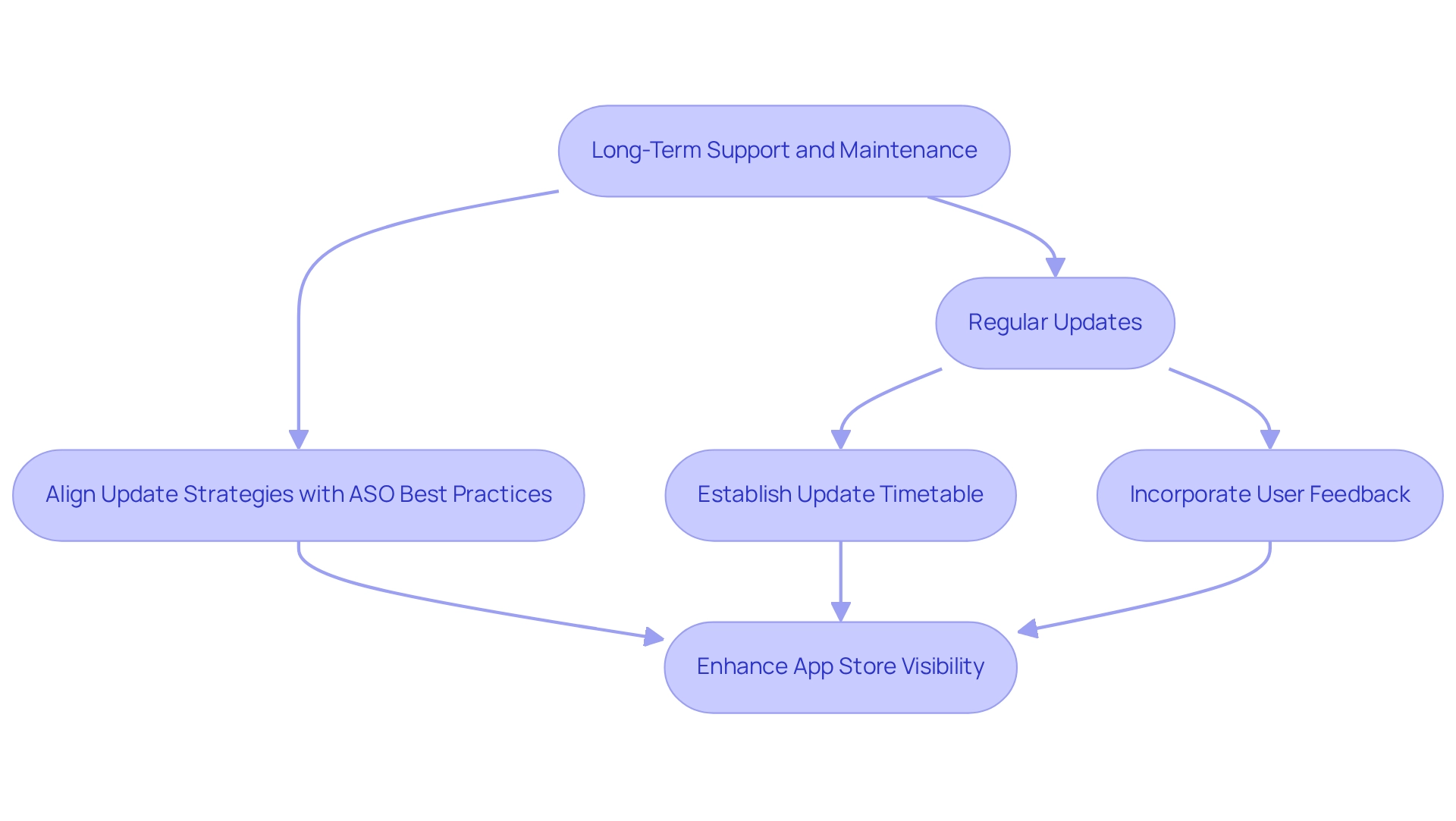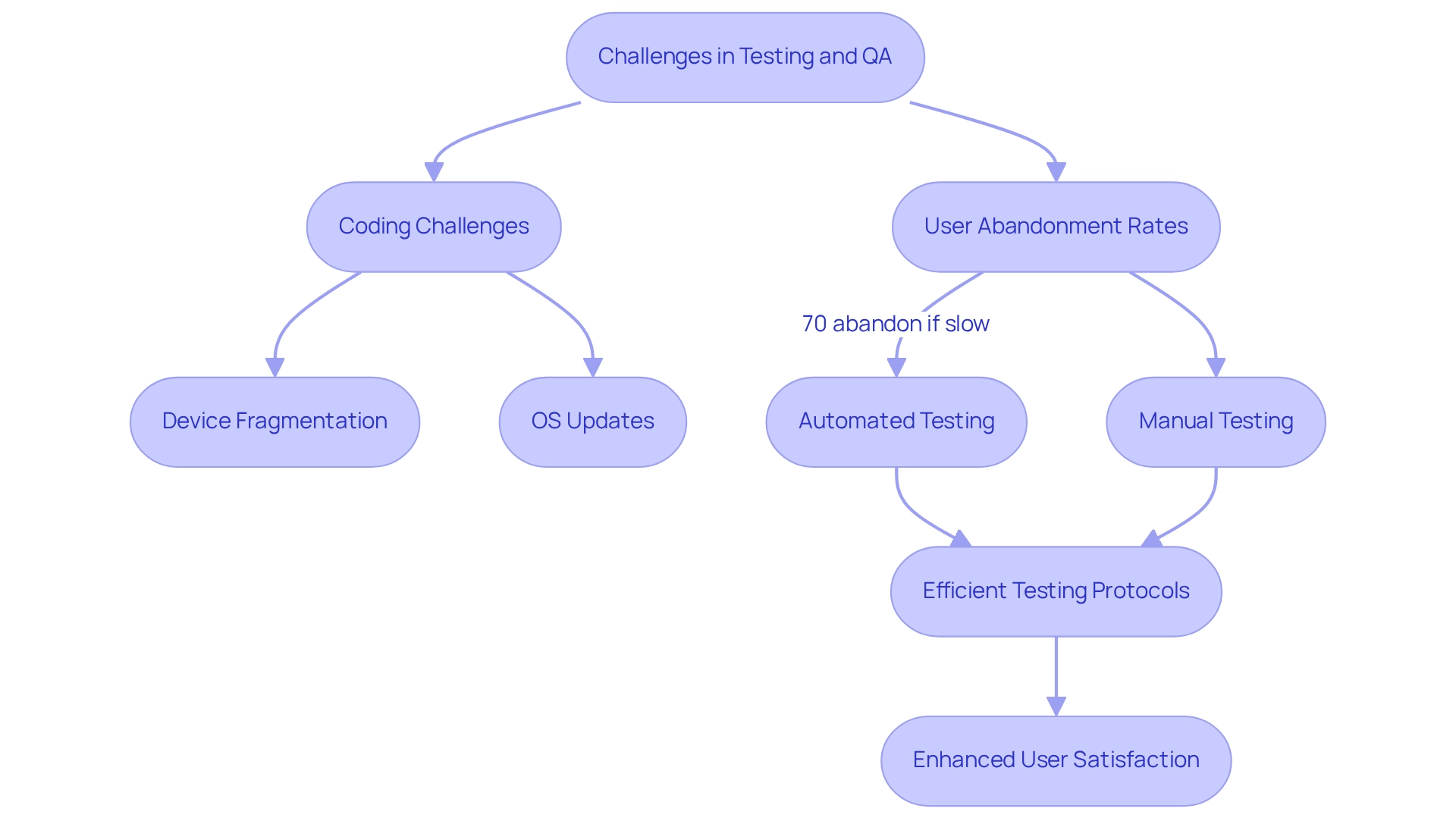Overview
The article highlights the challenges developers encounter in coding, particularly regarding app performance. It emphasizes the benefits of native Android development, showcasing its superior speed, access to device-specific features, improved security, and enhanced user experiences. Furthermore, the article provides evidence that native apps generally outperform cross-platform alternatives in load times and responsiveness. These factors are crucial for user retention and satisfaction, making a compelling case for developers to consider native development as a viable solution for their coding needs.
Introduction
In the dynamic realm of mobile app development, developers often encounter significant coding challenges that can hinder their progress. Native Android applications are increasingly seen as the gold standard for performance, user experience, and security. How can developers overcome these hurdles? Kodezi's OpenAPI Specification Generator offers advanced tools that streamline workflows, automate documentation, and enhance team collaboration.
Furthermore, native development provides multifaceted advantages. By leveraging device-specific features, developers can optimize performance while ensuring robust security measures. This approach also facilitates the delivery of intuitive user interfaces, crucial for engaging users. As the demand for high-quality applications continues to rise, understanding these benefits becomes essential for developers seeking to create impactful mobile experiences.
In addition, utilizing Kodezi leads to improved productivity and code quality. By automating repetitive tasks, developers can focus on what truly matters: crafting exceptional applications. Are you ready to explore the tools available on the Kodezi platform? Discover how they can transform your development process and elevate your coding practices.
Kodezi | Professional OpenAPI Specification Generator - AI Dev-Tool: Boost Your Native Android Development Efficiency
In the world of software development, coding challenges are all too common. How can developers streamline their processes and focus on building robust applications? Kodezi's OpenAPI Specification Generator automates the creation of API documentation, allowing programmers to concentrate on constructing strong software. By generating standardized specifications, Kodezi facilitates seamless API integration into native development Android applications, significantly boosting productivity and minimizing errors. This tool is particularly beneficial for teams engaged in complex projects, where clear documentation is essential for effective collaboration and ongoing maintenance. Have you ever considered how automated API documentation could enhance your workflow? Studies indicate that teams using such tools report a marked increase in efficiency, with well-documented APIs boosting programmer productivity by up to 30%.
Furthermore, Kodezi CLI acts as the Swiss-Army Knife for programmers, autonomously improving codebases, fixing bugs before they reach production, and automating code reviews—all while keeping API documentation synchronized with code changes. This integration further enhances productivity and code quality. For instance, a case study titled 'Efficiency in Content Distribution with APIs' illustrates how APIs enable automatic publishing and accessibility of content across multiple channels, resulting in a more integrated user experience and fluid information delivery.
As the demand for integrated API management platforms grows, Kodezi stands out by providing a consolidated view of APIs, streamlining discovery, observability, and security. This leads to a more cohesive development process. As Jeff Bezos aptly stated, 'all services must provide APIs and connect with one another using those APIs,' highlighting the critical role of API documentation in modern development.
Are you ready to experience these benefits firsthand? Users are encouraged to begin for free or arrange a demo of Kodezi's powerful tools.
Performance Optimization: Ensure Fast and Responsive User Experiences
Native development Android presents unparalleled opportunities for enhancing performance, ensuring that applications operate seamlessly on their intended devices. By leveraging platform-specific features and APIs, developers can substantially reduce load times and improve responsiveness. Key techniques encompass:
- Efficient memory management, which minimizes resource consumption
- Asynchronous processing that facilitates smoother multitasking
Advanced code optimization tools can swiftly rectify performance bottlenecks, identify security vulnerabilities, incorporate exception handling, and enhance code formatting throughout your codebase, ensuring compliance with the latest security best practices and coding standards. For practical application, developers can utilize profiling tools to pinpoint bottlenecks and implement code refactoring strategies to bolster performance. Additionally, refined rendering methods enhance the user experience, establishing local applications as the preferred choice for performance-sensitive scenarios.
Recent statistics indicate that local applications typically load more quickly than their cross-platform counterparts, with loading times being a crucial factor in customer retention. For example, studies reveal that applications with improved performance can reduce load times by as much as 50%, directly influencing customer satisfaction. Furthermore, KMM (Kotlin Multiplatform Mobile) allows for sharing Kotlin code between Android and iOS, providing a flexible approach for developers considering both local and cross-platform strategies.
Expert insights highlight that while cross-platform development offers advantages in speed and cost, local development excels in delivering exceptional performance and user experience, particularly for resource-intensive software. A case study titled 'Choosing the Right Development Approach' demonstrated that cross-platform development is ideal for MVPs and simpler applications, whereas local development is critical for performance enhancement in complex systems. Moreover, employing sophisticated memory management techniques led to a 30% improvement in app responsiveness, showcasing the tangible benefits of focusing on local development.
In conclusion, assessing project requirements and consulting with experienced professionals is vital for making informed decisions regarding app development strategies. The strategic implementation of native development Android not only boosts app responsiveness but also aligns with the growing demand for high-performance software in today's competitive landscape.

Access to Device-Specific Features: Leverage Full Hardware Capabilities
Developers often face significant challenges in coding, particularly when it comes to maximizing the potential of device-specific features. Native development Android software, for instance, benefits from direct access to device hardware, including GPS, cameras, and various sensors. This access enables the creation of applications that are rich in features and functionality, facilitating essential functions such as real-time location tracking, high-quality image capture, and advanced sensor integration. These capabilities are crucial in sectors like navigation, photography, and fitness tracking.
How can developers leverage these features effectively? Applications that utilize GPS for navigation can provide users with precise, real-time directions, significantly boosting engagement. Furthermore, statistics indicate that applications leveraging advanced sensor integration see a notable increase in satisfaction and retention rates. Studies reveal that engagement can rise by up to 30% when advanced features are utilized, showcasing the importance of integrating these elements into app development.
Moreover, programmers have observed that access to hardware features not only enhances app functionality but also leads to greater profitability due to heightened engagement. As emphasized in case studies, applications developed through native development android consistently surpass alternatives in terms of reliability and user experience, making them the favored option for creators aiming to maximize their offerings.
Consider how Kodezi can enhance your app development process. By utilizing Kodezi, developers can improve productivity and code quality, ultimately leading to better outcomes for their applications. To explore how Kodezi can elevate your coding skills, get started for free or request a demo today!
Enhanced Security: Protect User Data and Build Trust
In today's digital landscape, developers face significant coding challenges, particularly in ensuring robust security for their applications. Native development Android leverages the powerful security features of the Android operating system, such as secure data storage and encrypted communications. By implementing best practices—such as utilizing HTTPS for all network requests and establishing strong authentication mechanisms—developers can effectively safeguard sensitive individual information. This commitment to security not only ensures compliance with evolving regulations—like the fact that consent becomes void after 390 days—but also enhances trust among users, which is vital for any software's success.
Research indicates that 60% of individuals are willing to pay more for brands they trust to handle their data responsibly. Furthermore, as we look ahead to 2025, the integration of advanced security functionalities in native development Android continues to evolve, equipping developers with essential tools to protect individual data effectively. Kodezi exemplifies this proactive approach by offering automated code debugging and performance optimization, which help maintain secure codebases and enforce security best practices. By utilizing Kodezi, developers can swiftly identify and resolve code issues, optimize performance, and ensure adherence to coding standards, thereby bolstering overall software security.
Embracing these practices not only mitigates risks but also positions applications favorably in a competitive market where consumer trust is paramount. As Guardsquare highlights, globally, 5.19 billion individuals use mobile phones, dedicating 90 percent of their time to apps. This statistic underscores the critical need for strong security measures in mobile software. Are you ready to enhance your coding practices and ensure the security of your applications? Explore the tools available on Kodezi's platform today to elevate your development process.
Improved User Experience: Create Intuitive and Engaging Interfaces
Native development android presents unique challenges for developers, especially when creating intuitive and engaging interfaces that follow platform-specific design guidelines. By leveraging native components, developers can craft applications that resonate with users, ultimately enhancing overall usability. Key features such as smooth animations, responsive layouts, and touch gestures significantly contribute to a more engaging experience, increasing the likelihood of user retention.
Indeed, applications with intuitive interfaces can see a notable boost in retention rates. Research indicates that improving experience design by just 5% can lead to a remarkable 25% increase in profits. To quantify retention, one can use the formula:
Retention rate = (Number of individuals at the end of the period / Number of individuals at the start of the period) × 100.
Furthermore, incorporating gamification strategies—like rewards and challenges—can enhance participant engagement by up to 30%, demonstrating the effectiveness of engaging design elements.
As one UX designer aptly noted, even minor adjustments to the interface can yield substantial impacts on app retention. This underscores the critical role of native development android design guidelines in fostering user loyalty and satisfaction. Are you ready to explore how these principles can elevate your application development process?
Superior App Performance: Deliver Smooth and Efficient Functionality
Developers often encounter significant coding challenges, particularly when optimizing applications for performance. Native development Android applications are specifically optimized for the Android platform, resulting in significantly enhanced performance compared to cross-platform alternatives. This optimization manifests in several ways: efficient memory usage, accelerated code execution, and minimized latency during interactions. By fully utilizing the device's capabilities, native applications excel at managing complex tasks, ensuring a seamless and responsive experience.
This is particularly vital in gaming and multimedia contexts, where performance can directly influence user involvement and contentment. Kodezi's advanced code optimization features enable programmers to swiftly tackle performance bottlenecks, pinpoint security vulnerabilities, and improve code formatting. This ensures compliance with the latest security best practices and coding standards. For instance, in gaming applications, Kodezi can optimize resource management and execution speed, which are critical for maintaining high frame rates and responsiveness.
Research suggests that a strong ecosystem can cut development time by as much as 40%, enabling programmers to concentrate on enhancing app performance. Furthermore, success stories in the gaming industry demonstrate how local development can result in superior performance metrics, reinforcing the idea that local apps are frequently the optimal choice for providing high-quality user experiences. As developers continue to focus on memory usage optimization, the benefits of local software, particularly through native development Android, become more evident, especially in 2025, where performance comparisons consistently favor local over cross-platform solutions. In addition, many startups initially choose cross-platform development for speed and cost-effectiveness, as highlighted in the case study 'Choosing Between Cross-Platform and Native for MVPs.' However, they frequently shift to native development android later when advanced functionalities become essential. As noted in the quote, 'You can later shift to local if advanced functionalities become essential,' this strategic decision highlights the long-term advantages of local software.
Moreover, integration issues are common in cross-platform apps, which may not integrate seamlessly with local settings, leading to potential app failures. This further supports the preference for local software, particularly as success stories in education illustrate their beneficial effect on experience and engagement.

Long-Term Support and Maintenance: Ensure App Longevity and Reliability
Native applications rely heavily on ongoing support and updates from the Android platform, ensuring compatibility with new devices and the latest operating system versions. Regular updates are crucial for fixing bugs, enhancing features, and strengthening security. This proactive maintenance strategy not only prolongs the app's lifespan but also fosters user engagement through fresh content and features.
Have you considered how aligning update strategies with App Store Optimization (ASO) best practices can significantly enhance your app's visibility? By refining keywords, descriptions, and showcasing new features, you can drive downloads and maintain relevance in a competitive market.
As the mobile landscape continues to evolve, with smartphone subscriptions projected to exceed 7.7 billion by 2028, the necessity for regular updates becomes increasingly clear to cater to a growing audience. Industry leaders emphasize that a consistent update schedule, coupled with responsiveness to user feedback, is vital for sustaining app vitality.
Vladimir Terekhov notes, "By establishing a regular update timetable, reacting to feedback, and enhancing for the app stores, developers can preserve the vitality and significance of their app in a competitive market."
Effective maintenance strategies within the native development android ecosystem, such as regular feature enhancements and incorporating user feedback, demonstrate that continuous support directly impacts user engagement, ensuring that applications remain not only functional but also appealing to users over time.

Seamless Integration: Connect with Existing Business Systems
Native Android software facilitates seamless integration with existing business systems, such as CRM and ERP platforms, utilizing APIs and SDKs. This integration allows for real-time data exchange, significantly improving operational efficiency by automating various processes. By linking mobile software to backend systems, businesses can achieve greater data accuracy and streamlined workflows. This not only enhances decision-making but also increases overall productivity.
In fact, statistics reveal that 53% of enterprises employing ERP systems have embraced cloud-based solutions, highlighting the trend toward integrated mobile applications. Furthermore, developers consistently emphasize the advantages of API and SDK integration, noting that it enables more agile responses to business needs and enriches user experiences.
As Erik Kimberling, CEO and Founder of Third Stage Consulting Group, articulates, "AI in ERP software drives efficiency, enhances customer experiences, and informs decision-making," underscoring the essential role of integration in contemporary business environments.
As we progress through 2025, the significance of integrating business systems with native development Android apps will continue to escalate, fostering efficiency and innovation across industries. Moreover, case studies illustrate that companies effectively merging their mobile platforms with CRM systems experience substantial improvements in operational efficiency, further validating the necessity for seamless integration.
The average cost per user for ERP implementation hovers around $9,000, with approximately 38% of companies surpassing their budgets due to underestimations or expanded scopes, emphasizing the urgency for businesses to invest in effective integration strategies.
Custom App Development: Tailor Solutions to Your Business Needs
Native development enables businesses to create custom solutions that align precisely with their unique workflows and requirements. Have you ever faced coding challenges that hinder your development process? By concentrating on specific needs, developers can implement features that effectively tackle business challenges, significantly boosting operational efficiency. This level of customization enhances client satisfaction and ensures that applications harmonize with overarching business objectives. Investing in native development android becomes a strategic move for organizations aiming to thrive in a competitive landscape.
Furthermore, with 92.3% of internet participants accessing the web via mobile devices, the need for customized mobile solutions is more essential than ever. This trend is underscored by industry movements, such as Tietoevry's acquisition of MentorMate, highlighting the emphasis on enhancing software capabilities. Ongoing support and updates are essential for maintaining app relevance and performance. Successful case studies show that regular improvements maintain systems in line with client expectations and market dynamics, illustrating how customized solutions result in better ongoing support and heightened client satisfaction.
In addition, to further enhance this process, teams can leverage Kodezi CLI, a versatile tool that allows for quick AutoHealing of codebases. This significantly improves programming productivity. With Kodezi, programmers can begin at no cost and investigate demo options, simplifying the integration of effective coding methods into their native development android projects. Why not explore the tools available on the platform to see how they can elevate your coding practices?
Rigorous Testing and Quality Assurance: Deliver Flawless Applications
Native development Android applications encounter significant coding challenges, especially in testing and quality assurance. As the digital landscape evolves, developers must adapt their testing practices to meet new demands. Kodezi addresses these challenges by integrating automated testing frameworks with comprehensive manual testing, enabling developers to swiftly identify bugs and performance issues early in the development process. This proactive approach not only boosts user satisfaction but also minimizes negative reviews and uninstalls, which are crucial for an app's long-term success.
Did you know that 70% of individuals will abandon an app if it takes too long to launch? This statistic underscores the necessity of efficient testing protocols. Furthermore, developers must navigate challenges such as device fragmentation and frequent OS updates to maintain optimal app performance and user satisfaction in a competitive market. Kodezi's AI-driven automated code debugging empowers developers to instantly identify and rectify codebase issues. With detailed explanations and insights into what went wrong and how it was resolved, developers can ensure performance bottlenecks are addressed and security compliance is upheld in native development Android. Integrating robust mobile app testing and QA strategies, along with Kodezi's automated solutions, is not just beneficial; it is imperative for delivering successful applications that meet the demands of today's digital landscape through native development Android. Explore the tools available on Kodezi's platform to enhance your coding practices and elevate your app's performance.

Conclusion
The insights presented illuminate the challenges developers face in coding, particularly in the realm of native Android development. By integrating tools like Kodezi's OpenAPI Specification Generator, developers can automate API documentation and optimize workflows, significantly enhancing productivity while ensuring robust and well-integrated applications. The seamless integration of APIs into native applications not only streamlines development but also fosters collaboration among teams, which is vital in today’s fast-paced technological landscape.
Furthermore, the advantages of native development extend beyond mere productivity gains. Access to device-specific features empowers developers to create applications that deliver superior performance, user experience, and security. By leveraging the full capabilities of Android devices, developers can craft engaging interfaces and functionalities that resonate with users. This directly impacts retention rates and overall satisfaction. The emphasis on security and rigorous testing further reinforces the critical need for developers to adopt best practices that protect user data and ensure application reliability.
As the demand for high-quality, performance-driven applications continues to rise, embracing native development and utilizing tools like Kodezi becomes essential. This strategic investment in technology is not just about keeping pace with trends; it is about positioning applications for long-term success in an increasingly competitive market. By focusing on tailored solutions, ongoing support, and comprehensive quality assurance, developers can build applications that not only meet user expectations but also drive engagement and loyalty. The path to exceptional mobile experiences indeed starts with a commitment to native development and the innovative tools that enhance the coding journey.
Frequently Asked Questions
What is Kodezi's OpenAPI Specification Generator?
Kodezi's OpenAPI Specification Generator automates the creation of API documentation, allowing developers to focus on building robust applications by generating standardized specifications for seamless API integration.
How does Kodezi enhance productivity for developers?
Kodezi facilitates seamless API integration into native Android applications, significantly boosting productivity and minimizing errors, especially for teams engaged in complex projects that require clear documentation.
What impact does automated API documentation have on workflow?
Studies indicate that teams using automated API documentation tools report a marked increase in efficiency, with well-documented APIs boosting programmer productivity by up to 30%.
What features does Kodezi CLI offer to programmers?
Kodezi CLI autonomously improves codebases, fixes bugs before they reach production, and automates code reviews, while keeping API documentation synchronized with code changes.
How does Kodezi support integrated API management?
Kodezi provides a consolidated view of APIs, streamlining discovery, observability, and security, leading to a more cohesive development process.
Why is API documentation important in software development?
API documentation is critical for effective collaboration and ongoing maintenance, as highlighted by Jeff Bezos' assertion that all services must provide APIs and connect with one another.
What are the benefits of native development Android?
Native development Android enhances performance by leveraging platform-specific features and APIs, reducing load times, improving responsiveness, and ensuring applications operate seamlessly on their intended devices.
What techniques can improve application performance in native development?
Key techniques include efficient memory management, asynchronous processing, advanced code optimization tools, and refined rendering methods to enhance the user experience.
How does Kotlin Multiplatform Mobile (KMM) benefit developers?
KMM allows developers to share Kotlin code between Android and iOS, providing flexibility for those considering both local and cross-platform strategies.
What factors influence the choice between local and cross-platform development?
Local development excels in performance and user experience for resource-intensive software, while cross-platform development is often ideal for MVPs and simpler applications.
How can Kodezi improve app development processes?
By utilizing Kodezi, developers can enhance productivity and code quality, ultimately leading to better outcomes for their applications. Users can start for free or request a demo to explore its capabilities.




